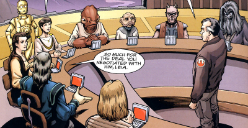Alliance Advisory Council
From TheHolo.Net Forums Wiki
- "We're all in danger. The Empire could burst in here at any moment and kill all of us."
- ―Kameis Sallian
Established as per the mandates of the Corellian Treaty, the Alliance Advisory Council consisted of seven beings who advised the Alliance Chief of State, and had the power to approve or disapprove any new policy put forward. They functioned as the legislative branch of the Rebel Alliance, and were also charged with the task of assuming executive power in the event of a Rebel victory over the Galactic Empire, to begin the process of establishing a new Republic.
History
The Advisory Council was one of the aspects of Alliance leadership required under the terms of the Corellian Treaty. When it was established, it consisted of representatives from Alderaan, Chandrila and Corellia - the three founding members of the Alliance - and in recognition for their actions, those worlds were granted permenant representation on the Council. The remaining members were appointed based on those races "who [gave] the most lives to the battle against the Emperor."
Prior to the Battle of Endor, the Mon Calamari, as well as Sullust and Ithor were significant members of the Council. After the extensive losses suffered by the Bothan Spynet during the efforts to acquire information on the second Death Star, the Bothans successfully petitioned for a representative from Bothawui to hold a seat on the Council.
Originally, the Advisory Council was intended to be separate from the Alliance Cabinet, providing a degree of legislative oversight to the executive branch. However, because much of the Alliance leadership were among the casualties of the Battle of Endor, the Alliance found itself without many of its experienced and qualified politicians; and many of those prominant figures who remained held positions of significance elsewhere in the Alliance. It became necessary for the distinctions between branches of the government to blur, and so many of the Representatives on the Advisory Council now hold positions elsewhere, either on the Alliance Cabinet or as part of the Alliance High Command.
Leadership
Though the Advisory Council itself had no specific leader, meetings of the Council were commonly chaired by the Chief of State. In situations where a degree of privacy was required - perhaps if a decision of the Chief of State was being called into question - one of the senior members of the Council would be nominated to chair a session in the Chief of State's absense. In such instances, a two-thirds majority from the Alliance Council was sufficient to remove the Chief of State from power, and call for elections to replace them.
In recognition of their long contributions to the Rebel Alliance, the three founding members are granted permanent seats on the Advisory Council.
- Alderaan - Celeste Starborn
- Chandrila - Kameis Sallian
- Corellia - Leeadra Longstar
The remaining four members of the Advisory Council are variable, and in theory they represent the races who have suffered the most losses at the hands of the Empire. However, since the Battle of Endor the representation has remained largely constant, and consists of members of four of the major non-human races in the Alliance.
- Ithor - Ixgis Habas
- Mon Calamari - Tukphen
- Sullust - Niev Minetii
- Bothawui - Torrsk Oruo'rel
Because many of those members now hold positions elsewhere in the Rebel Alliance - Leeadra Longstar serves as the Minister of War for example, while Torrsk Oruo'rel is the General commanding the Alliance SpecForce - the logistics of gathering the entire council for meetings has become problematic; particularly since the liberation of Bothawui, and the relocation of SpecForce and Alliance Intelligence to take advantage of the Bothan Spynet's infrastructure.
Large sessions of the Council are held when necessary, but for issues that require more pressing attention, small Oversight Committees - inspired by the Galactic Senate - have been established to cater for specific branches.
- The Intelligence Oversight Committee featured the representatives of Alderaan, Corellia, and Bothawui, due to their additional roles and expertise. They were granted top-level clearance to view classified mission reports.
- The Military Oversight Committee meanwhile included the representatives of Mon Calamari, Sullust, and Bothawui - the largest contributors of territory and military hardware to the Alliance - as well as Corellia and Alderaan.
- The Appropriations Commitee supervised the efforts of the Ministry of Supply, the Ordnance and Supply Command, and the Alliance Support Services, ensuring that vital resources were obtained and distributed to those who needed them, in a fair and imparial manner.
- The Commitee on Refugees represented the interests of populations who had been made homeless by the actions of the Empire, seeking out possible relocation sites in allied sectors.


